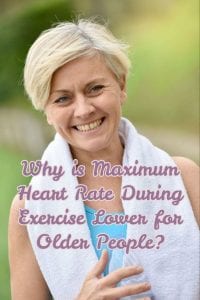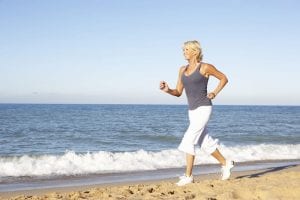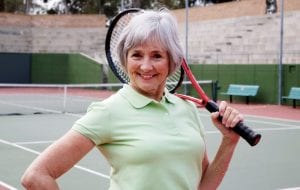 This article discusses why our maximum heart rate during exercise drops as we age.
This article discusses why our maximum heart rate during exercise drops as we age.
If you’re a regular at a gym or fitness center, you probably know that getting your pulse or heart rate into the right zone increases your workouts’ effectiveness and helps you burn more calories.
There may even be a chart on your studio’s wall that lists target heart rates by age bracket.
If you’ve looked at it carefully, you will have noticed that their target heart rate goes down as a person’s age goes up.
Reading the numbers, you may think that an older person’s maximum heart rate of 120 beats per minute makes for a more leisurely workout than a younger person’s whose maximum heart rate is 160 beats per minute.
This is simply not the case. The reality is that the older person whose heart rate has slowed is probably putting in more physical effort.
Keep reading to find out why our maximum heart rate drops with the passing of time.
Table of Contents
Maximum Heart Rate During Exercise and Older People
Many of the human body’s functions begin to slow down as we age. While we can delay this to a certain  extent, we cannot prevent it entirely.
extent, we cannot prevent it entirely.
Even the most physically fit individual who exercises regularly and has an excellent diet will eventually experience the gradual decline that comes with aging.
One organ that is affected is the heart which weakens over time.
Resting heart rate – the number of times your heart beats per minute when inactive – changes little with age.
Your maximum heart rate when exercising, on the other hand, does. This is partly due to the slowing down of the heart’s natural pacemaker, the sinoatrial node.
These changes occur due to altered electrical activity in proteins known as ion channels.
Picture a balloon covered in minuscule holes which open to allow air in and close to let it out. The balloon represents your heart, with the ion channels being the holes.
Another reason we experience a decreased maximum heart rate as we age is due to the thickening of the left ventricle walls.
Medical experts think that this occurs to help the heart cope with the extra stress that comes from pumping blood through ventricles that are less flexible.
To compensate for a slower pulse rate, older hearts pump more blood with each stroke than younger people’s hearts. Even with this higher stroke volume, less blood is circulated.
As a result, our aerobic capacity – how much oxygen we can take in during exercise – decreases.
The potential problems associated with this go beyond just not being as fit as we once were. It can be the difference between being able to live independently or not. 
But the news isn’t all bad. Your current level of aerobic capacity can be maintained to a large degree and improved at any age with the right exercise done regularly.
As you become fitter, your heart muscle will strengthen. When it does, more blood will be pumped and circulated throughout the body with each heartbeat, and more oxygen will enter the cells, boosting your aerobic capacity.
Centering your diet around nutritious food and maintaining a healthy weight will also help.
How much does Maximum Heart Rate During Exercise Slow as We Age?
On average, our maximum heart rate during exercise decreases by one beat every year or ten beats every ten years in older sedentary people. Physically active people of the same age will usually only experience a five to six beat decline every decade.
A target heart rate chart can help you determine an average heart rate relevant to your age.
Precautions
If you are overweight, older than forty, have a serious health condition, or are on medication, check with your doctor before undertaking a new exercise regimen.
The latter is because certain drugs, including some prescribed to manage heart conditions, lower high blood pressure, or treat low thyroid production, can slow the heart rate.
Under these circumstances, trying to reach your maximum heart rate could be extremely dangerous as you will be exerting more effort than is safe. 
If you are on any medication, ask your doctor if it could slow your heart rate. If they say it can, ask them to determine a safe maximum heart rate during exercise for you.
Additionally, if exercising at your maximum heart rate feels way too hard, don’t push it. If you experience any of the symptoms below, stop what you’re doing and see a doctor immediately.
- Excessive breathlessness
- Wheezing or uncontrollable coughing
- Pressure or pain in the chest
- Copious perspiration
- Fainting or feeling dizzy
- Severe cramping or muscular pain
- Nausea
- Overwhelming or long-lasting post-workout fatigue
Maximum Heart Rate During Exercise for Older People Summary
Exercise is beneficial at any age. Don’t despair because you can’t do what you did ten or twenty years ago. Set fitness goals appropriate to your age. Work to your current maximum heart rate during exercise, and you will be happier and healthier for it.
Click here to find out how to calculate max heart rate
You may also be interested in reading my Suzanne Somers Sexy Forever review.

